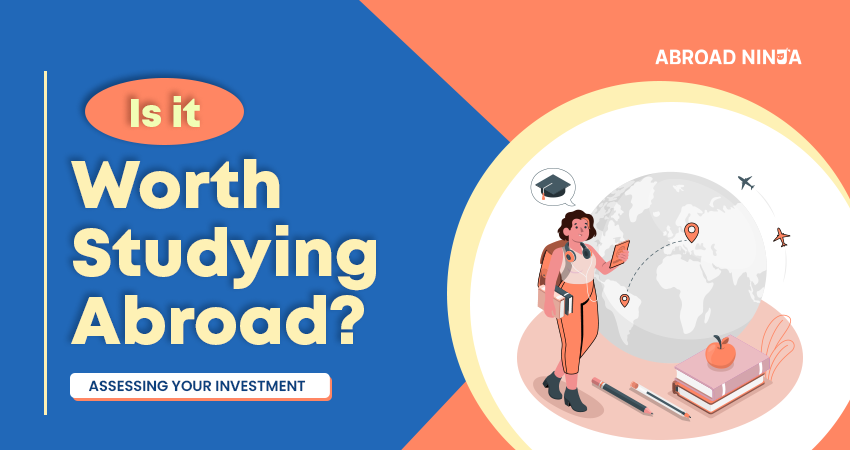In recent years, the prospect of studying abroad has gained immense popularity among students seeking a unique and enriching educational experience. However, the decision to study abroad involves a substantial investment of time and resources. This article “Is It Worth Studying Abroad? Assessing Your Investment” aims to assess the value and worth of studying abroad by examining the advantages, financial considerations, career opportunities, challenges, and real-life experiences associated with this endeavor.
Is It Worth Studying Abroad!! – Assessing Your Investment
Advantages of Studying Abroad
- Exposure to diverse cultures: Studying abroad provides an unparalleled opportunity to immerse oneself in diverse cultures, fostering a global perspective and cultural sensitivity.
- Access to world-class education: Many renowned institutions around the world offer cutting-edge education, exposing students to innovative teaching methods and research opportunities.
- Personal and professional growth opportunities: Living in a foreign country challenges individuals to adapt and grow personally and professionally, developing resilience and independence.
- Networking and global connections: Studying abroad facilitates the creation of a global network, connecting students with peers, professors, and professionals from various parts of the world.
Financial Considerations
- Tuition fees and living expenses: The cost of tuition and living expenses can be a significant financial consideration. However, it’s essential to weigh these costs against the potential benefits of an international education.
- Scholarships and financial aid options: Many universities and organizations offer scholarships and financial aid to international students, alleviating some of the financial burden.
- Potential return on investment (ROI): Assessing the potential return on investment involves considering the long-term benefits, such as enhanced career opportunities and increased earning potential.
Career Opportunities
- Global perspectives and marketability: Employers often value candidates with a global perspective and international experience, making graduates with an international education more marketable.
- Networking with international professionals: Studying abroad provides opportunities to build a global professional network, opening doors to international career opportunities and collaborations.
- Increased chances of securing a job abroad: Graduates with international education may find it easier to secure employment abroad, especially if they’ve built a network and gained familiarity with the local job market during their studies.
Challenges of Studying Abroad
- Cultural adaptation and homesickness: Adjusting to a new culture can be challenging, and homesickness may affect the well-being of students. However, overcoming these challenges can lead to personal growth.
- Language barriers: Language differences can pose a hurdle in communication and academic performance. However, many universities offer language support, and learning a new language is a valuable skill.
- Legal and visa complexities: Navigating visa processes and complying with legal requirements can be complex. Seeking guidance from the university and understanding the legal aspects is crucial.
Also Read: Top 10 Reasons: Why you should study Abroad?
Some Imp. Factors to assess – Is It Worth Studying Abroad!!
Decision-making Factors
- Personal goals and aspirations: Understanding personal goals and aspirations helps align the decision to study abroad with individual priorities.
- Academic and career objectives: Consider how an international education aligns with academic and career objectives, ensuring it enhances rather than hinders long-term goals.
- Financial situation and budget considerations: Evaluate the financial feasibility of studying abroad by creating a realistic budget and exploring available financial aid options.
- Long-term plans and post-graduation goals: Consider how studying abroad fits into long-term plans, including career goals, post-graduation plans, and the potential return on investment.
Real-life Experiences
- Testimonials from students who studied abroad: Reading testimonials from students who have studied abroad provides insights into the challenges faced, experiences gained, and the overall impact of their international education.
- Success stories of professionals with international education: Exploring success stories of professionals who pursued international education can offer inspiration and showcase the tangible benefits of studying abroad.
- Challenges overcome and lessons learned: Understanding the challenges students faced and how they overcame them provides a realistic view of the study abroad experience.
Tips for Assessing the Investment
- Researching universities and programs: Thoroughly research potential universities and programs to ensure they align with academic and personal goals.
- Exploring scholarship and financial aid options: Explore available scholarships and financial aid options to make studying abroad more financially feasible.
- Consulting with career counselors and alumni: Seek guidance from career counselors and alumni who have experienced international education for valuable insights.
- Creating a realistic budget and financial plan: Develop a detailed budget that includes tuition, living expenses, and miscellaneous costs. This helps in creating a realistic financial plan.
Conclusion
In conclusion, based on this guide – “Is it worth studying abroad?” we can say that the decision to study abroad is a significant investment that involves a balance of advantages and challenges. Hence, assessing this investment requires careful consideration of personal goals, financial implications, and the potential for personal and professional growth. While studying abroad may present challenges, the overall experience and long-term benefits can make it a worthwhile endeavor for those seeking a transformative educational journey.
However, it’s highly advisable that take the time to weigh these aspects based on your priorities with the help of best settle abroad consultants, and you’ll be well on your way to a fulfilling the life-changing decision.
FAQs
Q1: Can I work part-time while studying abroad?
A: Many countries allow international students to work part-time during their studies. However, it’s essential to check the specific regulations of the country you plan to study in.
Q2: How can I overcome homesickness while studying abroad?
A: Stay connected with family and friends through video calls, engage in local activities, and build a support network with fellow international students.
Q3: Is it possible to transfer credits between international and home universities?
A: Transferring credits varies between universities. Consult with academic advisors and explore transfer policies before making a decision.
Q4: What are the long-term benefits of studying abroad for my career?
A: Studying abroad can enhance your global perspective, cultural awareness, and language skills, making you more competitive in the global job market.
Q5: How do I choose the right destination for studying abroad?
A: Consider factors such as the reputation of universities, cultural fit, cost of living, and available programs. Research and attend university fairs for more information.
Also Read: Study Abroad Without Money: Insider Tips & Strategies




